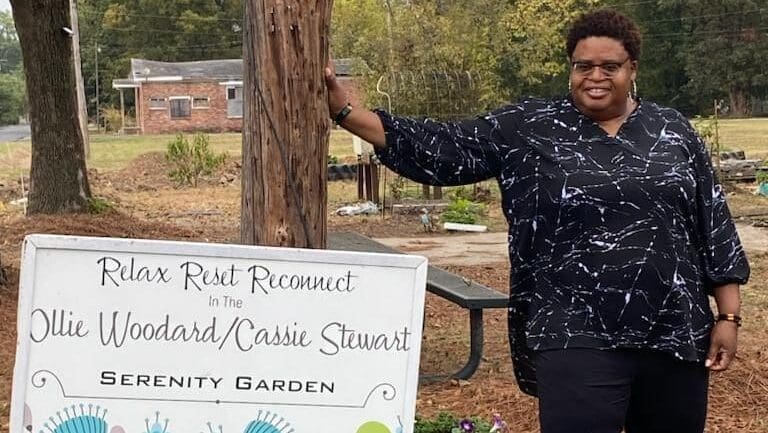In the rural town of England, Arkansas — located in Lonoke County, just southeast of Little Rock and northeast of Pine Bluff — a patch of once-abandoned land is blossoming into something far more powerful than rows of turnips and tomatoes. It’s becoming a symbol of healing, hope, and heritage.
Thanks to a reimbursable grant from the Arkansas Department of Agriculture’s Urban and Community Forestry Program — and a bridge loan from the Lending Team at Communities Unlimited (CU) — Melosong C.I.T.Y., a grassroots nonprofit led by longtime resident Vickie Woodard, is expanding what’s known locally as the Serenity Garden. The funding from the loan was provided by the Sachs Family Foundation.

Because the grant requires upfront spending, Woodard once again turned to CU, working with Economic Development Loan Officer Candence Brooks to secure the capital needed to begin.
This marks Woodard’s third loan through CU. Earlier this year, she received financing for her real estate venture, Melosong Properties. That same spirit of perseverance and community uplift now carries into her nonprofit work.
Melosong C.I.T.Y. — short for Creating Impact Through You — became a nonprofit in 2022, but its roots go back to 2019. That’s when Woodard and fellow concerned citizens began speaking out against years of disinvestment in their part of town. When efforts to get city officials involved stalled, they took matters into their own hands.
The result was a community garden designed to meet local needs — not just physically, with accessible raised beds and wide walking paths, but emotionally, too.

A retired teacher and entrepreneur, Woodard was especially moved by the health challenges she saw among older neighbors, many of whom were dealing with chronic illness or isolation. The garden became a place to reconnect and restore.
What began with clearing overgrown lots and building raised beds has since grown into a sustainable operation, complete with a drip irrigation system and support from local stores like Home Depot and Tractor Supply. The group has kept costs low while expanding its reach.
With this latest loan, Melosong C.I.T.Y. is poised to grow even further. In addition to planting the orchard, the grant supports education, conservation efforts, and a 250-foot expansion of the permaculture garden. Under USDA grant terms, nothing in the garden is sold — it’s all donated to the community.

“If you know of any grants that align with our mission — growing food to support health — we’re interested,” Woodard said. “We believe growing your own food can change lives. Strong, connected communities make a difference. That’s what Melosong C.I.T.Y. is about: strengthening our community so folks can come together — to work, to play, to gather, to know that your neighbor’s looking out for you.”
For grassroots organizations like Melosong C.I.T.Y., accessing funding can be one of the biggest hurdles. But with support from CU, Woodard found more than just a loan — she found a partner who believed in the vision.
“I’m boots on the ground — I’m that person,” she said. “And sometimes folks like us get overlooked.”
"We might not have the fancy language or all the paperwork in order, but CU met us where we were. CU helped me in terms of possibilities. They talked to me like a real person — not just someone checking boxes."
“I felt like I was talking to someone who really wanted to understand what this loan meant for us. And for us, planting fruit trees isn’t just about food — it’s about legacy. It’s our way of saying, I was here. I left my mark in that fruit tree.”
Melosong C.I.T.Y. is living proof that even in the smallest towns, big change can take root. To learn more or support their work, visit them at 319 South Washington in England, Arkansas, or follow updates on Melosong | City or Facebook.

